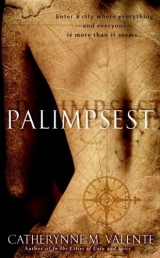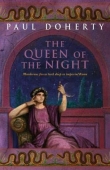
Текст книги "Palimpsest"
Автор книги: Catherynne M. Valente
Жанр:
Классическое фэнтези
сообщить о нарушении
Текущая страница: 5 (всего у книги 19 страниц)
He looked at the apocalypse of the Japanese book: spread over the floor, hundreds of linen pages, silver paint, black silks. He screamed at them: impassive, inelegant illustrations, trains like limp snakes. She would have done better, they would have been yawning leviathans under her pen, chewing through the belly of the earth. The ceiling swallowed his cry with genteel embarrassment. His deadline was long past, the contract given to another binder in Parma. He did not care, he had let it go. And this was left in place of his wife: pages, paint, silk. He pissed on them, he spat, he tore them, he ate them, he threw them from his window. There seemed to be no end to their number—it was an infinite beast, one surely known to whatever podium occupied his beloved Spaniard in the libraries of the dead. Ludo laughed in the dark and began to scrawl on the wall, near the baseboard, where he would not crowd Lucia’s hand:
18.c.1. In the remote west are creatures whose body is that of a great book with a spine of wood and glues the matter of which is like unto the blood of a man. In rage does the beast snap its covers and gnash its chapters one against the other, and should a man attempt to make end to such a one, it will spew forth the substance of its life in the form of pages without end, and he shall be overwhelmed entirely by the copious waste of the brute, and thus does the beast ransom itself from death . . .
He stopped, having no further joke to share with the ghost of her.
Seven sewn covers empty of pages stacked themselves into a rough Ionian column to bear up his coffee; spilled glue from the sinew of an ox had hardened into caramel below the defunct radiator. Four hundred and twelve pages had swallowed up the couch, the one Lucia had bought in Ostia because it was precisely the color of a pecan shell, on which she had slept naked and alone for three nights so as to drink up all that billowing color into her impossible skin. The ruin of the Japanese book covered his floor like a wrought carpet, and his steps sounded loudly, too loudly, on their leaves.
Ludo lay over them, the couch soft and flaccid beneath him now, no longer smelling of Lucia or the sea, or that summer on the beach when she wore only yellow, and she had not yet frowned in his presence, not even once. He put his face into the pages and breathed the desiccated smell of long-dry ink, sifting through it with archaeological patience, searching for the vanished weight of his wife’s knees pressing little cups into the fabric.
By the time the moon slid out of the sky like a button in a dress, Ludo had fallen asleep, curled in the lap of his book monster, an illuminated dining car stuck to his cheek.
_______
“Have you seen her?”
The sentence, its mere shape in his mouth like an old, flattened fig, exhausted him. He had stamped it with his tongue like a press, copy after copy, into the hands of everyone he met, all of their friends with tortoise-shell glasses and buckled shoes, briefcases with embossed mottos, pens tapped against teeth, frosted lips pursed, napes pinched, Chianti in fat-bellied glasses at a dozen cafés where he tasted nothing of the cakes or coffees set before him. He and Lucia had not been good friends, the two of them curled up like turtles into the shape of the other. They had rarely sought out the people they had known before the advent of their walled world, their untouchable quiet.
The woman across from him now was a university acquaintance, quite far down the list of Lucia’s folk. He was reasonably certain her name had been, presumably still was, Nerezza, something stiff and severe like that. Lucia collected severe and baroque humans like a grotesque kind of zookeeper. Nerezza’s flecked eyes were small and narrow; she looked angry even when she laughed.
“Why do you assume she has left you? There might have been an accident; you could call the police.” She measured out her voice through her lips like an iron flattening a sleeve.
Lions are watchful even when they sleep,he thought. “Because I know her! She meantto leave. She was always . . . a woman of intent.”
Nerezza laughed like a cough. “Yes, she was. How funny that we talk about her already like she is dead. Well. I could say that I’ve seen her, but I don’t think that would be of much use to you.”
Ludo waited, trying to be patient with her, to see what Lucia had loved in her, even in this to touch his wife. His palms sweated through the knees of his trousers. Such an ugly thing, the ever-leaking body. Nerezza scowled.
“Tell me, Ludovico,” she said, drawing deeply on her thin little cigarette. “Have you had any dreams lately? Bad ones, crazy ones, like the kind you have in a hospital, when they won’t let you out and you can’t see your family.”
“Of course. My wife has left me. I have terrible dreams, when I sleep at all.”
“That’s not what I mean. How about a rash? Like hives, but it doesn’t itch. Black. Like a tattoo.”
“Yes, yes, on my back. I don’t care about that. She had it on her knee. She said it was nothing. Communicable nothing, I guess.”
Nerezza rolled her eyes, stubbed out her cigarette. Ludovico loathed smoking. He had tried to explain to Lucia once that it contorted the humors, it was hot and dry and would burn out the delicate phlegmatic apparatiand leave her breathing fire. He had been earnest; she had kissed him with her mouth full of smoke, and his lungs had trembled, blazing, parched.
Nerezza rolled up the sleeve of her violet dress. There were lines on her forearm, Lucia’s lines, his lines. How dare she? How dare she bear on her body that last thing which had passed from his wife to him? But no cherubs winged at the edges of Nerezza’s streets. There was an oblong track in the center of the snaking avenues, like the Hippodrome seen from an impossible distance. On her flesh the mark was horrible to him, bare, violent, as though she had torn into herself with jagged glass—torn into him, into Lucia, taken their secret disease, their private travail.
“Now,” she said quietly, laying her arm on the table between them like a meal, like meat. “It is possible for me to say that I have seen Lucia. It is also possible that I know where she is now, that I am certain she is safe and well. It is even possible that I touched her face not three days past, and that we have passed men like a whiskey flask between us. These things I have to give you, but they are also lies, for I have not seen Lucia in the waking world, nor do I know where she is while we speak here, at this place, drinking this coffee, eating this crème caramel. It is for you to decide if you will take these things from me.”
Ludo closed his eyes. She talked like Lucia, dreamily, darkly, pregnant with meaning he sometimes thought pretended. The sun pressed its hands upon his face and he burned. “I will take them, Nerezza. Tell me where she is so that I can bring her home.”
“Ludovico, poor soul, Lucia will never come home. She won’t, and she doesn’t want to. I think—and it has been a long while since I knew either of you well—but I think it would be better if you told yourself she was dead, and believed it, and became a widower.”
Nerezza allowed a small smile, though it fit her face poorly. It was an encouraging smile, even motherly. Go along and play, little boy,it said. We are so busy; it is such work to be grown up.
Ludo grimaced. “If the world contained within it enough black to mourn her, perhaps I could. As things are, I am what I am, and she is what she is, and we are neither of us dead.”
She took his hand gingerly, the gesture of a sleek-legged rider approaching a great beast she intends to master. He was surprised to find no sugar lump in her palm. If Lucia was a chimera, heaving her great lion’s body from couch to floor to bed, Nerezza was an eel, dark and snapping, too slippery to touch, however fiercely she might be held. He recalled his Etymologiae: that the eel is born in mud, and eats earth, that the mud of the Ganges gives birth to giant eels, black and worm-blind, gargantuan, holy. Perhaps it was her and her inscrutable tribe of which Isidore spoke, sliding up out of the great ashy river with water beading on their breasts.
He gripped her hand suddenly and she disentangled herself with a deft motion, practiced at escape.
_______
Her apartment was not far from the café, but they did not stumble into it in the manner of lust-addled lovers. They walked, slowly and without ardor, hand in hand, into her house, where four long windows let in the diffident afternoon sun.
Her rooms were as severe as the angles of her own bones. There was a black chaise, a glass cabinet. She poured him a resinous yellow wine he did not like. He felt his eel—not his, surely!—circle him and was feebled by her. Nerezza settled her weight on his lap—she was heavier than she looked, as though her bones were made of iron. She moved her violet skirt aside—such an expensive thing, thick as a book cover, and her legs like pages.
“I am a path to her,” she said, her black eyes piercing and undeniable. Ludo had followed with a monk’s faith. He opened his mouth against her neck like a wolf, as though he could tear her open that way and find Lucia hiding, or waiting, inside. She moved her legs around him, sliding, squeezing things that would not let him free, so tight that his knuckles were pressed against them as he fumbled with his belt and kissed her again, deeply, with a crawling feeling of loss—Lucia would not like this. Or she would not care. Which did he want? Ludovico scratched her back brutally with his free hand, hoping that his marks would show as dark and dire as the maps on their flesh, the map she had no right to, yet bore.
Nerezza would not open her mouth no matter how he moved in her. She was wild-eyed, seething, but breathed serenely through her aquiline nose, her black eyes clamped on him like a bite. She was narrow within and without, and the press of her all around him threatened to force his soul out through the top of his head. He screamed into her—he could not help it. He screamed into the dark, into the empty house, into the compact interior world of Nerezza, the eel-hearted, the great and solemn beast who did not cry out in her shuddering, but bit his cheek savagely and held it hissing in her canines as he came like glass breaking.
Parimutuel Circle
THE LANES OF PARIMUTUEL CURVEin long, lazy arcs, so as to take in their circuit the whole of the Troposphere. The city shakes three times when the races ring the great baleen-railed track, when a hundred hooves send up sprays of black pearls, when the spectators as one throw back their heads and scream out the substance of their ecstatic wills. There is a dome, for rain in Palimpsest is like an eager lover: ever-present and zealous, steaming with ardor. Under the dome, chocolate silk sweeps down from a frame of kaleidoscopic glass, each bar blown in as many colors as a church window. Enormous orange lamps hang like miniature suns, banded up in black chains. And the track, the track of pearls, wheels in its grand circle, ever on. The stands are rarely empty: slavering, pilgrim-fervent, the crowd leans forward as one great, spangled body to see the poor beasts run.
Traugott’s voice, a copper pan shaken in the wind, sings up from the stalls. He is a breeder of snails and dwells in a house of three stories. In his youth he covered each of the floors in rich soils of black and red, leaves of gold and green, grains brown and sweet, violet petals as thick as a pat of butter. In his middle age, birch and fig saplings sprouted through the kitchen tile; hedges ring the furniture. His great petit-grisslowly move from parlor to wash-closet, gorging themselves in paroxysms of helicicial rapture. They mate in the chimney, sing softly the hymns of snails on the windowsills when the moon blanches the verdant paint to black.
And when the days of races approach, he takes the roundest and sweetest of them into his bedchamber, and on a brocaded bed so great it spans the floor entire, so soft he cannot bear to sleep upon it, he lays them down like children. There Traugott instructs his beloveds in an ascetic discipline, a consecrated fast, for the stomachs of men cannot bear very much of what the stomachs of snails contain. He leads them in prayer to the high Helix on her throne of soil, her opalescent flesh bound with sweet grasses, her eyestalks quivering with compassion, with mercy. So Traugott quivers as his jewels perish in purgation and starvation, so Traugott weeps for them as he polishes their shells and packs them into a green valise.
And with his bright case, Traugott stalks the stalls, his beard dyed to match the favored mounts of the day—today it is a spectral scarlet, and children reach out to touch the light of his long hairs, soft as a maid’s. He holds up his broad hands, full of little golden sacks—snails brim the edges, iridescent, the size of a dainty fist. He slurps one slowly, with pleasure, with grief. The taste of them like buttered brandywine, like sugared goosefat, melts on his tortured tongue. Seeing the bobbing of his ruddy, guilty throat, a dozen spectators clamor for his service.
_______
Nerezza wears a wide black hat festooned with long, pale swan-feathers tipped in onyx and obsidian. The whole affair is pinned with the lacquered pelvis of a lynx. It shadows her face like an eclipse and she licks the meat from her snail shell with precise delicacy, flicking the shriveled body into her narrow mouth. She stares down at the track from their high box, garlanded with leather reins, and raises a pair of silver opera glasses, trembling, to her face.
“It will start soon,” she says.
“What will?” Ludovico sits straight as a soldier. His left hand itches—there is nothing there, but he feels his flesh blazing, crawling with bees, while his right droops with the weight of a cold porcelain hand. He can hear the roaring of trains and the small voice of a viola in the dark. He is arrested by these things which he can feel but are not with him, not present in the stadium. But the scent of the steaming snail cuts through their shadows, and a murmur passes through the waiting audience. They hold their breath as one.
“The night races, Ludo.”
“You promised me Lucia, not horses.”
“She is here. I have not seen her yet. But I am watchful.” She proffers the glasses.
When lions sleep, their eyes are ever-watchful,he thinks. He takes the lenses, looks down to the track and its improbable gravel—there are horses there, yes, stamping their hooves and snorting, but they are monstrosities of leather hung over a clanking, clattering framework. Bronze ribs show through tears in the brown skin, creased and stained like an old map case. Their eyes are gaping holes that show occasional flames: whatever engine drives them spits out its heart in sparks and blue jets. They are thin; constricted chests tucked up like starving whippets, spindled legs never approaching equine proportion, concluding in bronze spikes that pierce the pearls of the racing ground. Their manes are braided backward into their tails, one massive leather cord proceeding from head to haunch in a sweeping arc.
“They are so beautiful,” Nerezza breathes. “I know the woman who makes them—she lives in Silverfish, on the outskirts, on an estate that would beggar Naples. She has a scar on the small of her back, shaped like a liver. A colt bit her when she was young.”
“This is a dream,” Ludo sighs. He is not patient. “A dream, and I shall wake up sticky.”
She gives him a withering look, and several of the outlandishly dressed folk near them—one hoists a parasol of sleeping gray lizards—recoil as though he has uttered a vulgar curse. He is saved in his shame by the sounding of a long, low horn, something like those Swiss leviathans Lucia had loved. The leather horses explode from their dock—the crowd throws back their sparkling heads as one and screams. Nerezza’s own cry is high and piquant and terrible, and the horses screech their response, like the death of a thousand owls. Their mechanical gait is awkward and jerky, their spikes driving into the track, but the speed is undeniable, and it is over before Ludo can think it a dream again, the one with a red handprint on its rump streaming ahead in the last stretch.
But no one applauds; their approval is silence, and it is total. Nerezza exhales slowly, shakily, as she did when she climbed from him and fell asleep on the carpet like an exhausted cat.
The next racers line up, but they are not horses. They are men, and women, too, their legs contorted into animal limbs—leopard, gazelle, lion, lizard, horse, and ostrich. They stand upright, most of them, on two exotic legs and stare miserably into the stands, their glares like accusations.
“Who are they?” Ludo asked.
“Veterans,” Nerezza sniffed. “This is a charity race. Pay no attention, the box seats are not supposed to deign to watch.”
The horn sounds like the death of a great whale and Ludo obediently turns away, pretends to be reading the newspaper of his neighbor, a thing more like a broadside than La Repubblica; he admires the letter-pressing, the decorated corners, reads idly about the paramours of a woman whose name means nothing to him, philippics on immigration and quarantine. The Dvorniki have been spotted on the south side of Zarzaparrilla—this publication would like to take the opportunity to thank them for their difficult and vital work.The paper smells faintly but distinctly of vinegar. Nerezza laces her black-gloved hand through his; he stiffens, but supposes resignedly that this is within the sphere of licit behavior, given that her inner thighs must still be bruised by his thumbs. She wears a ring over the glove on her middle finger, a tourmaline beetle with bulbous copper eyes. He keeps his gaze firmly on it, and cannot be sure he does not see its antennae waver. Her grip tightens on him, her finger-pads recalling thumbscrews. The beetle ring bites into his knuckle.
And he follows her eyes, eel-inscrutable, down the stands from their scarlet and leather box. Two women sit far below them: a blond creature with a green scarf, her hair like water pouring over an emerald riding uniform. Her gloved hand clasps the fingers of another woman, with coarse heaps of dark hair fastened with bronze compasses, graphite-nubs extending gracefully from their claws. She wears a calfskin dress, the exact color of her flesh. It is Lucia, of course it is Lucia, and her face is nakedly happy, a happiness it seems almost obscene to witness.
Ludovico calls out to his wife, and she turns slightly, but surely she cannot hear him over the cannonade of hooves and foot-pads below them, the sudden rain of pearls. She screams with the rest; the blond woman shuts her eyes in the convulsion of her cry.
“Does this help you?” Nerezza says. “To see her, that she is here, that she belongs somewhere, that she is happy, that she has a lover, that she knows how to behave in the society? Does it fill up the place in you where she lived?”
Ludo screeches her name over the din, but Nerezza holds him, pins him, her beetle ring, her gloved hand. She is too far away, his Lucia, his chimera, snapping her tail in the dust to hide her tracks.
“She can’t hear you. If you fling yourself over the balcony you will only bleed on the couple below us and break your bones on their chairs. Ludo, I brought you to see her, I didn’t say you could touch her, that you could bring her back. You are a cut-rate Orpheus, and she has already vanished behind you on the stone stair—you did not even feel her go.”
“I don’t understand! Lucia! Lucia!”
“She is blessed, Ludo. Perhaps she will touch a higher grace still, a grace we scream to enter but cannot even approach. That I cannot approach. We can only watch her, who may be permitted to see the silver cup but cannot touch it, can never drink.”
Ludo weeps openly; tears drip from his chin like rain from a roof. Nerezza leans into him, covering them both with the brim of her hat. She licks the tears from his face.
Far below, Lucia throws back her shining head and laughs.








